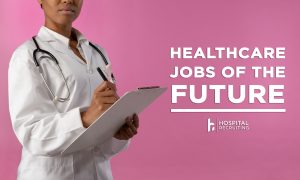
Healthcare is an ever-changing field with technological innovations creating constant opportunities for clinicians to advance their careers into new areas. New methods of diagnosis, treatment, and patient care delivery are continually being developed creating new roles that healthcare providers can be involved in.
To be relevant in this ever changing field of healthcare clinicians must stay current with new trends and opportunities. Being aware and adaptive can enable healthcare professionals to be ready to seize new opportunities and advance their careers by being part of new innovations.
Current Trends Shaping the Future of Healthcare Jobs
Most of the current trends in healthcare jobs are driven by technological developments. These changes provide new ways of providing patient care but also require new and different types of clinical expertise. The following trends are significantly shaping job opportunities in healthcare:
Digital Health and Telemedicine
Telemedicine has been an up-and-coming technology for several years; however, the COVID-19 pandemic redefined the importance of this technology. Telemedicine is already changing the way healthcare is delivered, with patients taking advantage of the opportunity to consult clinicians without having to leave the comfort of their homes. This has led to an increased need for health experts who can manage telehealth platforms and deliver effective patient care remotely.
Artificial Intelligence (AI) in Healthcare
AI is another technology that was up-and-coming for several years but suddenly became more relevant. With the emergence of ChatGPT in late 2022, public awareness of AI and the benefits it offers exploded. AI has the potential to revolutionize healthcare, assisting in disease detection, patient care, and even in developing new treatments. At a minimum, healthcare providers will need to be familiar with AI and how it works. Becoming proficient in new AI technologies will open new doors for clinicians as explosive growth in this area continues.
Personalized Medicine
With advancements in genomic sequencing, personalized medicine has emerged as a game changing healthcare approach. Many healthcare providers, however, are surprisingly unfamiliar with personalized medicine and the benefits it offers patients. Clinicians who are well versed in precision medicine and the benefits it provides will be far better positioned than their peers.
Wearable Technologies and Health Data
Wearable health technology devices, like fitness trackers and smartwatches, generate an immense amount of data about a user’s health. The growth in the popularity of the Apple Watch has especially impacted wearables. There is a growing demand for healthcare professionals who can analyze this data and draw meaningful conclusions for preventive care and wellness.
Healthcare Job Opportunities of the Future

Being aware of current trends provides healthcare providers with an opportunity to stay more up-to-date with each trend. There are, however, potential career changes for each of these advances that clinicians can consider:
- Job Roles in Telemedicine – As telemedicine becomes more mainstream, telemedicine roles as a physician, nurse practitioner, physician assistant, and even nurse are gaining importance. As a telemedicine provider, a healthcare professional will apply their expertise remotely, using their existing skills in a new way.
- AI Roles in Healthcare – Being proficient in using AI is quickly going from nice-to-have to essential. All clinicians should be familiar with AI and how it can enhance patient care. It is hard to predict how rapidly changing AI technologies will open up new job roles for clinicians, but existing roles in data science and clinical informatics are already growing due to AI-related changes.
- Careers in Genomics and Personalized Medicine – As personalized medicine grows, there will be an increasing need for clinicians specializing in personalized medicine and genomics. The number of roles in precision medicine and its related fields, like genomics, is set to grow exponentially. AI is also likely to further augment the growth of precision medicine.
- Jobs Relating to Wearable Technology – The explosion of wearable technology has created a demand for clinicians skilled in health data analytics. These professionals will be expected to understand and analyze data from wearable devices to inform healthcare decisions and promote patient wellness.
Preparing for the Healthcare Jobs of the Future
To prepare for future healthcare jobs, the most basic thing clinicians can do is to stay abreast of technological developments and seek continuous education opportunities.
Clinicians can benefit from seeking increased exposure to areas that are rapidly developing through online courses, seminars, workshops, and by seeking new clinical experience where they work. Networking with professionals in these emerging fields can also provide insight into their evolving landscapes and where new opportunities lie.
The future of healthcare is on its way. The clinicians who are prepared for it will help lead the way and be among those who ultimately thrive as disruptive change occurs.
